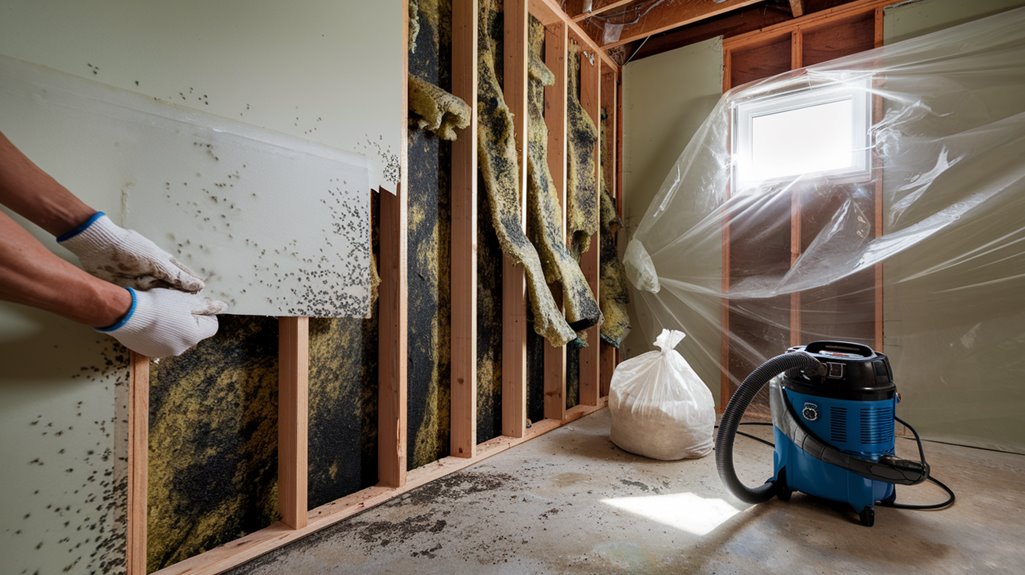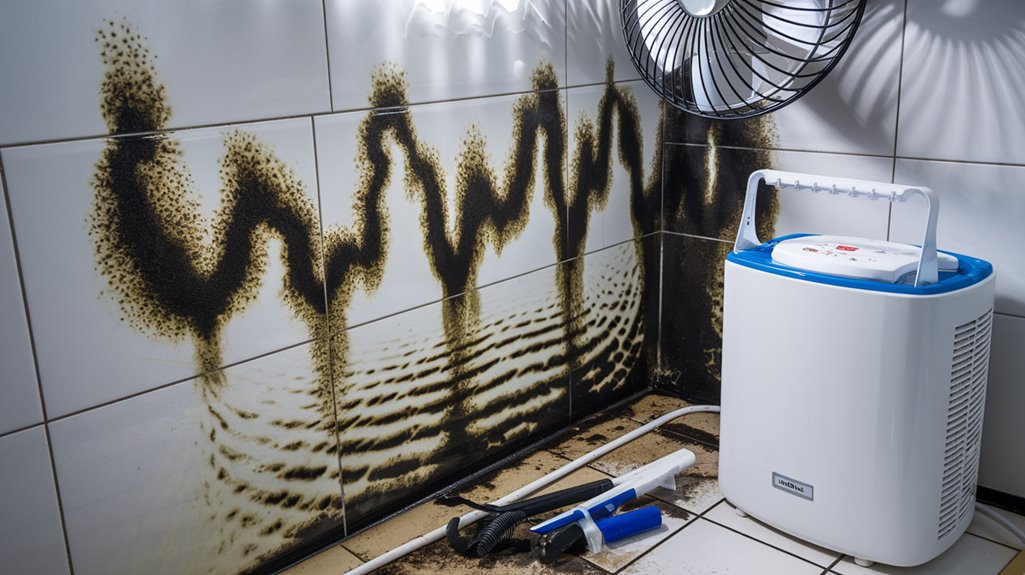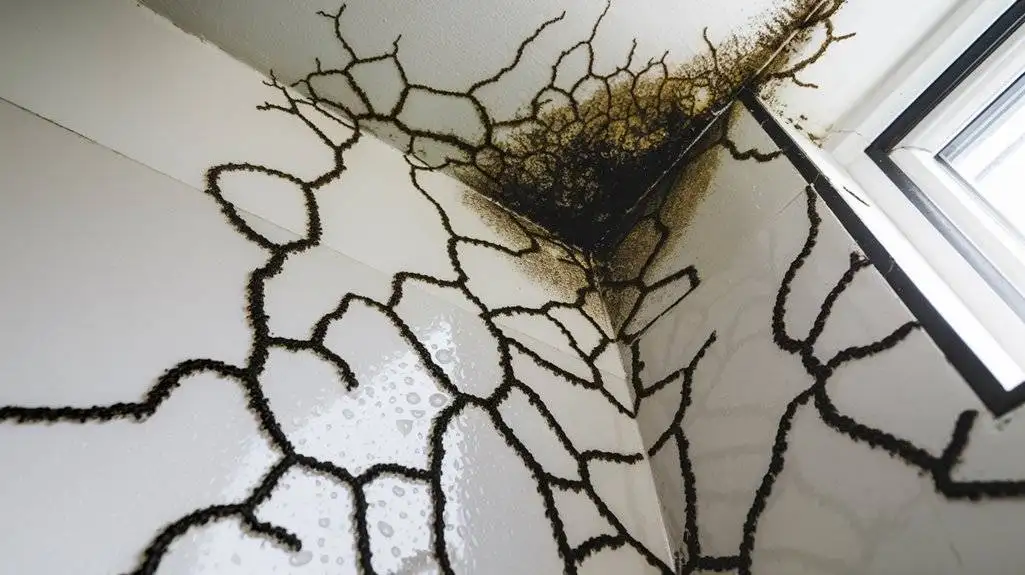Discovering mold in your home can trigger panic and anxiety about selling your property. Many homeowners face sleepless nights worrying about decreased property value and potential buyer reactions. The mere sight of these unwanted patches can shatter your dreams of a smooth home sale.
You might feel trapped between expensive remediation costs and the fear of losing potential buyers. Every showing becomes stressful as you wonder if buyers will spot the problem.
The anxiety grows when you consider disclosure requirements and legal implications. When selling a house with mold, you can either fix the problem first or sell as-is with proper disclosure.
This guide will walk you through each step of selling a mold-affected property while protecting your interests and maximizing value. We will show you practical solutions and strategies to navigate this challenging situation successfully.
Key Takeaways
- Schedule professional mold inspections to assess damage extent and obtain documentation for potential buyers.
- Disclose all known mold issues to buyers as required by law to avoid legal penalties and build trust.
- Address moisture sources and complete remediation before listing, keeping detailed records of all repairs and treatments.
- Price the property competitively, factoring in repair costs and local market data for homes with similar histories.
- Work with real estate professionals and lawyers to ensure compliance with disclosure requirements throughout the selling process.
Can You Sell a House with Mold?

You can sell a house with mold, but proper steps must be taken. If you handle the situation correctly, buyers will feel more confident about their purchase.
Your first step is to schedule a professional mold inspection. The inspector will determine how serious the mold problem is. After the inspection, you should get a detailed report about the affected areas.
We recommend fixing any mold issues before listing your property. This decision will help you attract more potential buyers. You must disclose all known mold problems to avoid legal troubles later.
When you invest in proper mold removal, your home becomes more marketable. If buyers see proof of professional remediation, they will feel more secure. You should keep all documents related to mold treatment and prevention.
It is essential to work with professionals who specialize in mold remediation. So, make sure you hire certified experts for inspection and cleanup. While the process might be costly, it will protect your interests during the sale.
Is it legal to sell a house with mold?
You can legally sell a house with mold in most states with proper disclosure. This process requires you to inform buyers about any existing mold problems. You must be honest about current and past mold situations in your home.
Legal steps for selling a house with mold:
- You need to fill out state disclosure forms with complete mold information.
- We recommend keeping records of past mold treatments and expert inspections.
- You should let buyers check the property for mold concerns.
If you hide mold issues, buyers can take legal action against you. This could lead to canceled contracts or costly lawsuits. Working with a knowledgeable real estate agent will help you follow state rules.
Key points to remember:
- Your state laws decide what mold information you must share
- A proper disclosure protects you from future legal problems
- You should document all mold-related repairs and treatments
Since laws vary by state, we suggest consulting a local real estate expert. If you handle mold disclosure correctly, your home sale will go smoothly.
How to Sell a House with Mold
To properly sell your house with mold, you’ll first need to thoroughly assess the extent of the problem through a professional inspection that identifies affected areas and underlying causes. You’ll want to weigh the costs and benefits of professional mold remediation against your home’s potential market value, as proper remediation can significantly enhance buyer confidence and sale price.
Consider obtaining multiple quotes from certified remediation specialists who can document their work, as this documentation will prove valuable during disclosure and negotiation phases with potential buyers.
Assess the Mold Problem
A proper mold assessment helps determine the extent of growth and damage in your property. You need a clear understanding of the situation before selling your house with mold issues.
We recommend starting with a simple check of your entire property. This step includes looking for dark spots and water damage on walls or ceilings. You should also pay attention to any musty smells throughout the house.
If you find signs of mold, take clear photos of affected areas right away. When documenting the problem, note down exact locations and measure approximate coverage sizes.
A professional inspection will uncover hidden mold problems in your home. Since experts have specialized tools, they can detect mold behind walls and under floors. They will also identify the specific type of mold present.
If the inspection reveals extensive damage, you might need additional testing services. While small patches of mold may require simple cleanup, large infestations demand professional remediation.
Your next steps will depend on the assessment results and expert recommendations. So, make sure to keep all inspection reports and documentation for potential buyers.
Consider Mold Remediation
When you find mold at home, you must decide how to handle the cleanup properly. You can clean small mold patches under 10 square feet by yourself. However, larger mold problems need expert help to ensure complete removal.
If you plan to sell your house, you should tell buyers about any mold issues. This disclosure often results in buyers offering less money for your property. Yet, you can protect your home’s value by hiring professional mold cleaners. We recommend getting proper documentation from mold experts after their work. When professionals finish the job, buyers feel more confident about the purchase.
If you notice any signs of mold, you should first get a thorough inspection. This inspection will show hidden problems and help plan the cleanup work. Professionals can then create an effective treatment plan based on these findings.
Identify and Fix the Moisture Source
Moisture sources must be found and fixed before any mold cleanup can begin. You should first locate where the water enters your home. This step will prevent future mold problems.
These key areas need special attention:
- You must check all plumbing systems for hidden leaks. We recommend inspecting pipes under sinks and behind walls. It’s important to look around water-using appliances too.
- Your roof needs regular checks for water damage. If heavy rains occur, you should inspect gutters and foundation walls. Water can enter through small cracks or gaps.
- You need proper airflow in high-moisture areas. Your bathrooms, kitchens, and basements require good ventilation systems. Humidity levels often rise in these spaces.
If moisture issues remain unfixed, mold will keep coming back. You might need help from moisture detection experts. They can find hidden water sources that you might miss. This professional service will ensure complete moisture detection.
Contain and Remove Mold-Infested Materials

Proper containment helps prevent mold from spreading to clean areas during the removal process. You need plastic sheets and tape to seal off areas with mold growth. It is safe to clean small areas under 10 square feet by yourself. When cleaning mold, you must wear proper safety gear and use suitable cleaning products.
Professional help becomes necessary for large mold infestations. This type of work requires special tools like HEPA filters and air pressure systems. If you try to remove extensive mold yourself, you might cause bigger problems.
So, trained experts should handle major mold removal projects. We recommend letting professionals dispose of moldy materials properly. They will test the area after cleanup to ensure safety. When selling your home, these test results can prove the mold issue was resolved.
Clean and Disinfect Affected Areas
Clean and disinfect practices remove harmful mold from affected surfaces in your home. You must address moisture problems first to stop future mold growth. If you handle small areas, wear protective gear and follow safety steps.
Steps for effective mold removal:
- You should use EPA-approved disinfectants after cleaning visible mold signs.
- This process requires HEPA vacuums to clean nearby surfaces and catch loose spores.
- You need to take photos before and after cleaning for proper documentation.
When mold spreads widely, professionals should handle the cleanup process. They will use specialized tools and proven methods. If you see extensive mold damage, contact a certified remediation expert. These specialists know how to eliminate mold safely and effectively.
This approach ensures complete mold removal from your property. Your home will stay safe and healthy after proper treatment. So follow these steps carefully to achieve the best results.
Dry, Restore, and Prevent Future Growth

After completing mold remediation, you’ll need to investigate your selling options, including pricing your home competitively based on its condition and the local market.
You can list traditionally through a real estate agent who understands selling homes with past mold issues, or consider selling to cash buyers who’ll purchase the property as-is without requiring additional remediation.
Whatever path you choose, be prepared to negotiate transparently with potential buyers while documenting all mold-related repairs and prevention measures you’ve implemented.
Price the House Competitively
You must set a fair price when selling a house with past mold problems. This situation requires a thoughtful approach to determine the right market value. Research shows buyers often seek lower prices for homes with previous mold issues.
We recommend following these key steps for competitive pricing:
- You should study local sales data for houses with similar histories. This research will reveal typical price differences between regular homes and those with mold records.
- It is essential to include all repair costs in your calculations. So, add up expenses for mold testing, cleanup work, and prevention methods.
- You can offer a small price reduction to address the property’s past. We suggest highlighting all completed repairs with proper documentation.
If you price the house too high, potential buyers might avoid viewing it. When you balance the price with market expectations, more buyers will show interest. This strategy helps sell the property faster while maintaining reasonable value.
The final price should reflect both market conditions and improvement costs. Hence, gather professional opinions to support your pricing decision.
List Your House
You must check for moisture and mold issues before selling your home. We recommend installing dehumidifiers in areas that tend to collect moisture. It is essential to repair any water leaks right away. If you find mold, a professional remediation service should handle the cleanup.
When selling your home, honesty about past mold problems is crucial. You should provide buyers with detailed records of all remediation work. This documentation must include moisture readings and professional air quality test results.
Your transparency will help build trust with potential buyers. A home warranty covering future mold issues can attract hesitant buyers. If buyers see proper documentation, they will feel more confident about their purchase.
Negotiate and Close the Sale
Negotiations for Mold-Affected Properties You must be upfront about previous mold issues when selling an affected property. We recommend a clear strategy to handle buyer concerns about this sensitive topic. This approach will help build trust and lead to successful negotiations.
Critical Steps for Negotiations:
1. Documentation and Records
Professional reports will prove that proper mold treatment has been completed. You should collect all remediation paperwork before listing the property. We can share these documents with potential buyers during negotiations.
2. Warranty Coverage
If buyers express concerns, you can offer specific mold coverage protection. This warranty will cover any mold-related problems for twelve months after purchase. The coverage terms should clearly state the extent of protection.
3. Price Considerations
You might need to adjust the selling price to reach an agreement. When buyers raise valid concerns, a fair price reduction could help close the deal. The final price should reflect both the property’s value and its history.
If the buyer requests additional inspections, you should cooperate fully. Since transparency builds confidence, open communication will support successful negotiations. While addressing concerns takes time, it leads to smoother transactions.
Skip Remediation? Sell As-Is to Cash Home Buyers
Selling to cash buyers offers a quick solution for homeowners facing serious mold problems. You can avoid expensive remediation costs by choosing this alternative path. Cash buyers will purchase properties with mold damage at any severity level.
If you decide to sell as-is, you must still disclose all known mold issues. Legal problems could arise when sellers hide existing mold conditions from buyers. We understand that cash offers are typically lower than market prices for clean homes. This option eliminates the need for repairs, home inspections, and bank financing.
When you work with cash buyers, they often have connections with mold remediation companies. You should request multiple cash offers to get the best price for your property. If the mold situation feels overwhelming, cash buyers can close quickly and solve your problem. This solution provides immediate relief from a stressful property situation.
Benefits of Selling a House with Mold As-Is
You can gain multiple advantages by selling your mold-affected property in its current condition. If you choose an as-is sale, you will save time and avoid complex remediation processes.
The benefits include:
- You will save significant money by skipping costly mold removal treatments.
- We understand that cash buyers readily purchase homes with mold problems.
- Your sale process will move faster without repair negotiations or multiple inspections.
While traditional buyers might reject mold-damaged properties, investors often welcome such opportunities. Since cash buyers specialize in damaged properties, they can close deals quickly. If you work with experienced investors, you could complete the sale within days.
This solution works best when extensive mold damage makes traditional selling impossible. So you can avoid the stress of lengthy remediation while still getting a fair offer. When time is critical, an as-is sale provides a quick and practical solution.
Legal obligations when selling a house with mold?

When selling a house with mold, you’ll need to comply with your state’s specific disclosure requirements, which typically mandate reporting any known mold issues to potential buyers.
Your local regulations may require professional documentation of mold presence and remediation efforts, particularly if the property has a history of water damage or previous mold treatments.
You should consult with a real estate attorney to understand your exact obligations, as failure to properly disclose mold problems can result in significant legal responsibility and potential lawsuits after the sale.
Disclosure Requirements
Mold disclosure laws require sellers to inform buyers about any known mold problems in their property. You must share all details about mold issues with potential buyers during the sale.
This requirement protects both parties from future legal problems. Proper records will serve as evidence of your honest dealings.
Follow these steps for proper disclosure:
- You should fill out your state’s disclosure forms with complete mold information.
- We recommend taking clear photos of all affected areas in your home.
- It is essential to keep inspection reports and remediation receipts on file.
- If you have hired professionals, save their assessment reports and test results.
The consequences of hiding mold issues can be severe for sellers. You might face heavy fines or legal charges for non-disclosure. If buyers discover undisclosed mold, they could cancel the contract or sue for damages.
When mold issues are present, transparency builds trust with potential buyers. So, maintaining detailed records of all mold-related incidents is crucial. Your honest approach will protect you from future legal complications.
State and Local Regulations
State and local governments enforce different rules for mold in real estate transactions. You must study your area’s specific laws about mold disclosure and testing requirements. While some states need professional testing before sale, others want special papers for mold cases.
If your state has tough rules, you will need reports about mold types and cleanup work. Some places require licensed experts to check and clean mold problems. You cannot hide mold issues as this breaks laws in many areas. This illegal action can lead to heavy fines and penalties.
We recommend keeping all mold-related papers and records after the cleanup is done. You should talk to a real estate lawyer to follow local rules correctly. Since laws change often, it helps to stay updated with current regulations.
If you discover mold issues, proper documentation will protect you from future problems. This careful approach ensures smooth real estate deals and prevents legal troubles.
Ready to sell your house quickly? Contact Freedom Path Investors today
Selling a house with mold requires careful planning and proper disclosure. You can choose between professional mold removal or selling the property as-is. These options will affect your selling price and timeline.
We help homeowners sell their mold-affected properties quickly for cash:
- We buy houses in Peters
- We buy houses in Fallon
- We buy houses in Affton
- We buy houses in Ballwin
- We buy houses in Florissant
At Freedom Path Investors, we specialize in purchasing homes with mold problems. We are cash home buyers who can close quickly without requiring repairs. Contact us today at (314) 710-2550 for a no-obligation cash offer. We will handle all paperwork and closing costs.







